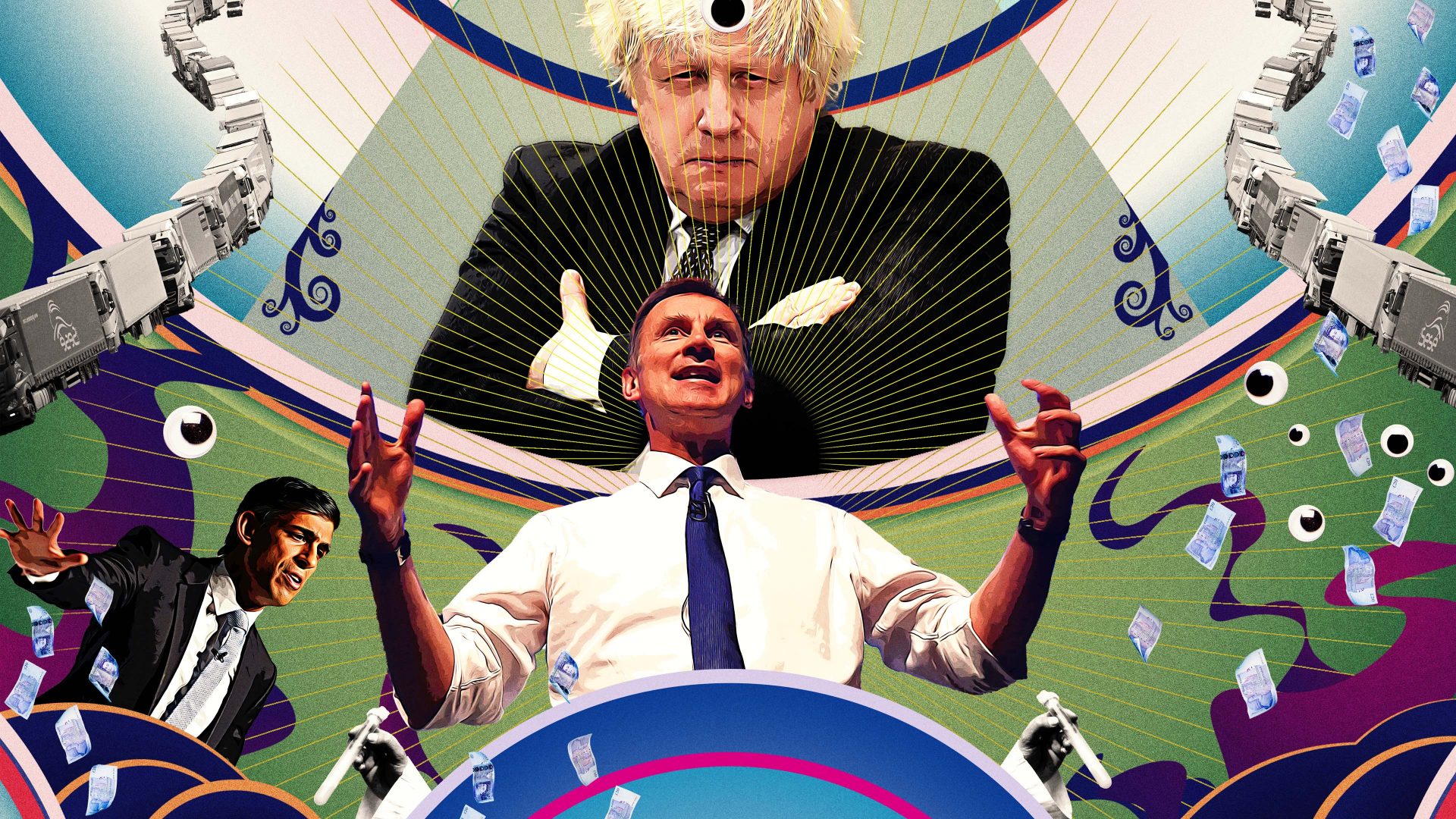Named best picture at the Oscars, Everything Everywhere All At Once introduces us to a woman who leads different lives in several parallel universes.
Britain is also living in its own alternate reality. There is the surreal world where the government lives, in which Brexit is going absolutely to plan and delivering success after success. And the real world inhabited by the rest of us, in which everyone can see the damage that leaving the EU is doing to our economy.
The budget allowed us to slip between these two universes, just as best actress winner Michelle Yeoh does in the movie. In one was the rictus grin of Jeremy Hunt declaring everything to be absolutely fine. And in the other was the small print in the budget calculations by the Office for Budget Responsibility (OBR) showing just how not-fine everything really is. So let’s count all the ways that the budget showed Brexit wrecking everything, everywhere, all at once…
The economy, stupid
Ahead of the budget, the OBR – an independent public body that marks the Treasury’s work – crunched all the numbers and confirmed its previous view that Brexit has made the UK economy 4% smaller than it would have been had we stayed in the EU.
How did the government respond? By sending the chief secretary to the Treasury, John Glen, on to BBC’s Newsnight, where he said: “We gave the people a choice, that decision was made seven years ago. They made a choice, and we are, as a government, taking advantage of all the opportunities that we can.”
If that quote sounds like code for “we’re doing our best to manage your bad decision”, that’s probably because Glen voted Remain and, having had the OBR’s analysis on his desk for the last couple of weeks, knows the only opportunities from Brexit are lost opportunities.
Those lost opportunities
The OBR has confirmed, then, that Brexit is costing the government a fortune. What could we have used the money on instead?
In the budget, Hunt confirmed an extra £11bn for our armed forces, raising the total defence spend to 2.25% of GDP. But without Brexit, it could have trebled defence spending instead to 6% of GDP, or around £215bn. That would have meant another £143bn for defence rather than £11bn.
Or, rather than scrabbling for savings in order to fund the overdue pay rise for our healthcare workers, it could have increased NHS and social care spending from around £184bn a year to £327bn.
Of course no government would have spent all the money that Brexit has cost the economy. The UK government normally taxes and spends one third of GDP, so as a result of Brexit it is probably £40-50bn a year worse off.
The Brexit debt-and-tax trap
The budget makes clear that the government is still borrowing lots of money – the equivalent of 5.1% of GDP in 2023-24, dropping to 3.2% in 2024-25, then 2.8% in 2025-26, 2.2% in 2026-27 and 1.7% in 2027-28. But if we hadn’t Brexited, that borrowing would have shrunk. The extra revenue would mean we needed to borrow less and we wouldn’t have the largest tax burden ever in order to raise the money necessary to fund the government’s spending plans.
As the Institute for Fiscal Studies explained in its analysis of the budget, “the overall outlook for the public finances still looks difficult. Tax continues to rise to its highest-ever level, and to much higher levels than in recent decades. Yet even with very tight spending pencilled in from 2024, debt is barely falling. That’s because a high debt level, high debt interest payments, additions to debt that are not included in borrowing, and sluggish nominal growth, make it hard to get debt on a decisively downward path.”
Or, as the OBR put it, “it is now harder for this chancellor to deliver a falling path for the debt-to-GDP ratio in the medium term than it has been for any of his predecessors since the OBR was established in 2010.”
Hunt is putting a brave face on it, but at a time of a disastrous fall in living standards, the country is faced with the largest tax burden in years and huge levels of borrowing. A sustained period of economic growth would help both, but Brexit has slashed our long-term average growth rate, and there is little sign of it improving.
The wasted billion
There was some good news in the budget… for the very rich. While the chancellor sold changes to the pension system as a way of encouraging retired doctors back to work, they are really just another way of giving huge tax breaks to the wealthy. Removing the total limit that people can save into their pension pots will cost £1bn a year, nearly all of it going to the best-off.
Remember that one of the principal reasons for a shortage of workers is Brexit. So this is £1bn a year wasted to try to get some people back to work who we wouldn’t need back in work if we were still in the EU. Brilliant.
When Liz Truss and Kwasi Kwarteng broke the economy and ended their political careers by borrowing in order to cut the top rate of tax for the richest, it was going to cost us £2bn a year. This pension giveaway to almost exactly the same wealthy people will cost £1bn a year.
By wrapping it up as a pension tax change that will create jobs, the chancellor is returning to Trussonomics. It is harder to imagine a better example of why trickle-down economics is a con. Let the rich live a life of tax-avoiding luxury in their old age and justify it by saying it creates jobs, but without mentioning they are costing £100,000 each to create.
This was, of course, one of the justifications for Brexit that went unmentioned at the time. Make the UK into Singapore-on-Thames, where the rich are attracted to the country by huge tax cuts, and the rest of the population subsidises them with higher taxes and even worse public services.
A constructive admission
There was a gleam of sunlight in the budget cast on the disaster that is Brexit when Hunt added the construction industry to those that can now bring skilled workers into the country more easily. But rather than in the past, when British building firms could simply recruit from across continental Europe, they have now had to wait for the Migration Advisory Committee to place five new construction roles on the shortage occupation list: bricklayers and masons; roofers, roof tilers and slaters; carpenters and joiners; construction and building trades; and dryliners and plasterers.
This is nice, but necessary only because the building industry has suffered from a massive and sustained shortage of skilled workers since Brexit, and without this move, growth would have been even more deeply damaged. It turns out that free movement was good for the British economy and whole sectors are still dependent on importing skilled workers.
If over the last seven years the government had actually started a massive series of training schemes to upskill the British workforce, this might not have been quite so desperately necessary, but they didn’t, and it is.
And then there was all the stuff Hunt didn’t announce, either because we can’t afford it because of Brexit or because it’s a good idea that clashes with stupid Brexit ideology…
Nothing on the Horizon
Where was the announcement of the money to fund the re-entry of the UK into the Horizon research project, an EU scheme that was so obviously a success for the UK that even the Brexiteers agreed to stay in after leaving? Having been blocked from membership because of our threats to break the law over the Northern Ireland Protocol, the UK has been offered the chance to rejoin thanks to the Windsor Framework. Yet for some unfathomable reason, Rishi Sunak is dragging his feet.
The list of organisations dying to get back into Horizon is as long as your arm – virtually every medical charity, university, research body and industry – and the economic benefits are huge, but the PM is unmoved.
The Freeport scam lives on
Freeports are still a useless idea, but at least Hunt has cut the number of Liz Truss investment zones to just 12. They are also a waste of time and money, but the Brexiteers like to think they would be impossible if we had stayed in the EU, so they love them. Of course, the Brexiteers are wrong – the EU is dotted with freeports.
The cost of living crisis
As prices rise (partly thanks to Brexit), the OBR confirmed that average households will see their disposable income fall by a further 6% over the next two years – the biggest drop in living standards since records began. We will have living standards lower than before the pandemic, the worst record for any major economy. That slow post-Brexit growth really hurts; and there was nothing from Hunt to help.
Rough trade
The OBR also made clear that the UK’s trade – rocked by post-Brexit disruption and red tape – is bang on course for the 15% fall it predicted. Healthy trade improves productivity and keeps prices down; so no wonder inflation is a bigger problem for the UK than for other countries.
Meanwhile, that shameful 15% drop is all the evidence needed to show that the idea that Brexit made this country Global Britain is a lie.
The lost investment
And finally, the Bank of England recently revealed that Brexit has cost us £29bn in lost business investment since the referendum, because of uncertainty and red tape. Hunt is piling tax incentive on tax incentive to try to get British businesses to invest, but even his own figures show that will only bring forward expected business investment, not create more of it.
This means future growth, which depends on current investment, is unlikely to take off. We are stuck in a lower-growth, post-Brexit world.
Overall then, a look at our post-Brexit universe shows that we have lower growth because of Brexit, higher taxes because of Brexit, and still have worse public services because of Brexit. The economy is being choked by red tape because of Brexit and is short of workers because of Brexit; so the government is using that as an excuse to throw billions at the wealthiest in pension tax cuts to create a few thousand jobs, which would have been filled effortlessly pre-Brexit by immigration from the continent.
Never mind the multiverse; Brexit has made everything multi-worse.




